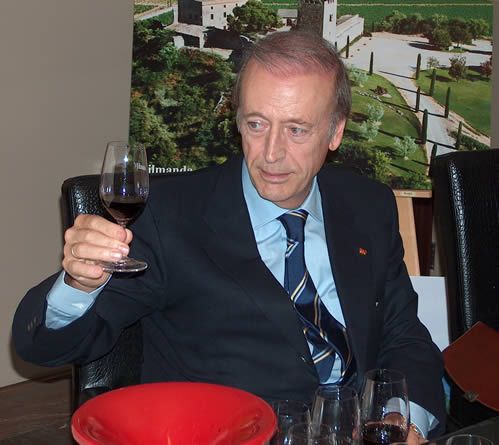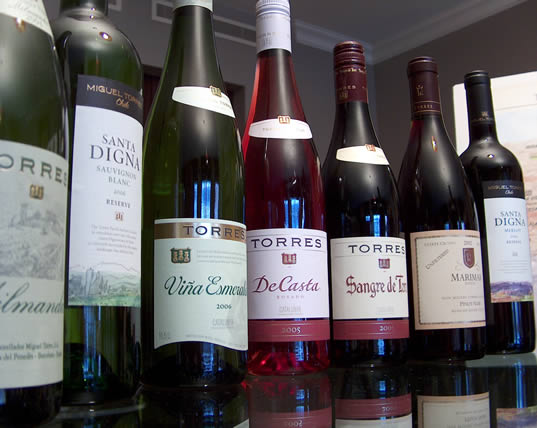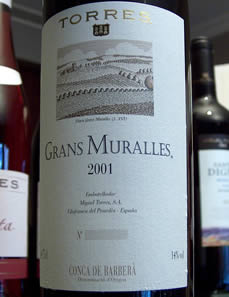|
Meet
Miguel Torres:
the man behind Spain's leading brand

Torres is one of the most recognizable names in Spanish
wine, and is the UK’s leading Spanish brand making up 7% of Spanish
exports to the UK. Their big brands: Vina Sol, Vina Esmerelda and
Sangre de Toro (with or without the plastic bull!) are found
everywhere. And they’re consistently good wines.
Ever since I first started drinking wine in earnest,
back in the early 1990s, I’ve had a soft spot for Torres. The night
before I got married, among other wines, I remember sharing a bottle
of the Gran Sangre de Toro with my brother and father. [Yes, not
terribly grand, I know, but we were poor and I was only just
discovering wine.] Over the years, the ever-reliable, fresh Vina Sol
has been one of our house whites.
So I was delighted to get a chance to interview Miguel
Torres and then have lunch with him at the Square, one-to-one. We also
tasted through the Torres range.
Torres have 1700 hectares in Catalonia, which provides
a quarter of their production. They make up the shortfall by buying in
grapes, but unlike many other big companies, they don’t buy wine.
Moving out of their Catalan home, they now make wine from other
Spanish regions, with a 40 hectare estate in Toro, and a 140 hectare
Jumilla property, of which 50 hectares is so far planted. For four
years they have had a small cellar in Ribera del Duero, where there is
now a surplus of grapes, so they buy these in rather than owning their
own vineyards. The most recent move has been to Priorat (Catalonia’s
most famous region), where they made their first wine in 2005 in a
rented cellar; from last year (2007) it was made in their own winery
there.
Torres was founded in 1870 and is 100% family owned.
Miguel is 4th generation; the 5th generation is already in the
company. In 2005 sales were 2.5 million cases, up from 600 000 in
1993. More than 1000 people are employed in the company.
Miguel Torres comes across as a modest man, but one
with a quiet authority. He knows his stuff, but wears the knowledge
lightly. Back
in 1982, when there were problems with the family succession (his
father wouldn’t retire and let go of the company), Miguel took a
sabbatical year out and went and studied at Montpellier, brushing up
his winemaking and viticulture knowledge. When he returned to the
company he brought this new knowledge back and applied it. Today
Torres spend €3 million a year on their viticultural and winemaking
research, tackling some of the hot topics in wine science. For
example, they are working with precision viticulture (which aims at
measuring natural variation across a vineyard with a view to using
this information for differential management to improve quality), and
are developing near infrared spectroscopy methods for non-destructive
in-vineyard analysis of grape anthocyanins (which means that they can
then pay growers according to quality much more accurately than, for
example, measuring sugar and acid levels).
Among the interventions Miguel made on his return from sabbatical was
changing the density of planting in the Torres vineyards, and adapting
the canopy management. What he learned about rootstocks helped him
save his sister’s vineyards in California’s Russian River Valley,
where at the time everyone was planting the phylloxera-susceptible
AXR1 rootstock.
The Torres family now have a family succession protocol
– this is essential if you want a large family business like this to
work. 65 is the retirement age, and then the boss can stay on as
president until 70. This means the children know they just have to
wait five years, and avoids a Mondavi-like succession crisis.

Torres as a company have taken a keen interest in the
issue of global warming. In response to climate change they are buying
land closer to the Pyrenees, where temperatures are cooler. They’ve
also had to adjust their viticulture. ‘In the past we have wanted to
advance maturation to avoid problems with botrytis from the rains’,
says Miguel. ‘Now we are doing the opposite, trying to delay
maturation, for example by adjusting the density of planting and
playing with the canopies’. Normally the fruiting arm is 50–70 cm,
but if this is made larger it delays maturation. Global warming also
makes water an issue. ‘In the future we will have to irrigate
more’.
As well as being Spanish giants, Torres also have a
sizeable operation in Chile. ‘We went to Chile in 1979, when we were
the first foreign wine company’, says Miguel. ‘My father and I
agreed we should have a base in South America’. There were a number
of tax advantages in producing wine in South America, so Miguel was
sent out to explore Argentina and Chile, and decided to settle on
Chile, for reasons of good soils, climate and people. It was a
long-term investment and Torres now produce 4 million bottles in
Chile, which is 1% of all exports, going to 50 different markets.
How does he see the global wine market, current and
future? At the moment, he says, the market is difficult. Back in 2000
he was making double the profit per case than he is now. There’s an
excess in supply globally. In the past, wine was largely a European
thing and distillation and grubbing up vines could deal with this
excess production. Now though the surplus is not just a European thing
and so this is no solution. But there’s hope. The difference between
excess and production and excess demand is just a glass of wine. He
also reckons the future for Spain is much brighter than for France,
because Spain has brands, which France largely lacks. ‘Wine is here
to stay’, says Miguel. ‘Wine in moderation is healthy’.
Torres Viña Sol 2005 Penedès, Spain
100% Parellada. ‘It’s not a fragrant grape, but when fermented
properly at cool temperatures you get nice fruity aromas’, says
Miguel. Bright fruity nose: crisp, fresh, a bit appley with some lemon
notes. The palate is crisp and fruity with nice personality. Fresh and
minerally. Delicious. 85/100
Torres Santa Digna Sauvignon Blanc Reserva 2006 Valle
Central, Chile
Quite refined grassy nose with a subtle green herbal note, with
some passion fruit. The palate is fruity with a nice herbal tang.
Tasty. 85/100 (UK retail £5.99)
Torres Milmanda Chardonnay 2004 Conca de Barbera, Spain
Single vineyard, fermented in new Nevers oak. Quite rich. Sweetly
fruited nose with smooth creamy coconut and vanilla notes. The palate
is quite broad, smooth and nutty, with a creamy texture. Stylish and
nicely poised if currently a bit oaky. 89/100 (£19 UK retail)
Torres Maquehua Cordillera Chardonnay 2005 Curico,
Chile
Ripe, rich and dense with an interesting melony green herbal
character to the fruit. Quite full and fruity with oak in the
background. Full flavoured but showing some restraint. 89/100
Torres Viña Esmerelda 2006 Catalunya, Spain
Moscatel with a bit of Gewürztraminer. Pretty, bright and quite
aromatic with sweet grapey fruit. There’s a hint of lychee, too. A
fresh, pretty wine with a bit of sweetness (c. 10 g/litre residual
sugar). 87/100
Torres de Casta Rosé 2005 Catalunya, Spain
Pink/orange colour. Bright strawberry fruit nose leads to a
vibrant palate with lovely fruit. Hint of sweetness. 83/100
Torres Sangre de Toro 2005 Catalunya, Spain
A blend of 65% Grenache with 35% Carignan. Aged for six months in
a mix of American and French oak, of which half is new. Deep coloured.
Juicy, ripe and sweetly fruited but with a tangy savoury edge and some
spiciness. Nice balance: a food-friendly wine. 86/100
Torres Coronas 2004 Catalunya, Spain
Tempranillo with a dash of Cabernet, aged for nine months in
French and American oak, of which half is new. Slightly closed black
fruits nose which is quite pure. The palate shows good dense, slightly
sweet fruit with some tarry, spicy underpinning. A broad, full wine
with a nice spicy finish. Very good commercial winemaking. 88/100
Torres Santa Digna Merlot Reserva 2004 Valle
Central, Chile
Distinctly Chilean, with ripe blackcurrant fruit nose. Pure and
sweet. The palate is ripe and smooth with a bit of spice, as well as a
tiny hint of greenness. Drinkable stuff. 83/100
Marimar Estate ‘Don Miguel Vineyard’ Pinot Noir
2002 Russian River Valley, Sonoma, California
From a 40 Ha estate bought in California in the early 1980s, run
by Miguel’s sister Marimar. Ripe, smooth, quite sweet berry fruit
nose. Quite full but not jammy. The palate is concentrated and full
with lots of ripe, sweet fruit and some spicy tannic structure. Some
meatiness here. 90/100
Torres Celeste 2004 Ribera del Duero, Spain
Aged 12 months in Frenc (75%) and American oak, of which a third
was new. This is a stylish wine. Smooth dark chocolatey richness to
the nose, which shows ripe fruit. The palate is firm but has a lovely
sweet black and berry fruit character with suppleness and elegance.
There’s a tight, spicy structure underneath. Forward but with a good
future ahead of it. 92/100
Torres Cordillera 2003 Valle Central, Chile
65% Carignan (40 year old vines, unirrigated), 25% Syrah and 10%
Merlot. Nine months in Nevers oak (30% new). Dark colour. Lovely ripe,
sweet spicy nose with a bit of meatiness and some soy notes. The
palate shows dense, concentrated, ripe fruit with a savoury, spicy,
meaty edge. Finishes quite tannic. An impressive wine. 92/100 (UK
retail £9.99)
Torres Mas La Plana 2003 Penedès, Spain
100% Cabernet from the Mas La Plana vineyard; old vines (40+
years), aged for 18 months in new  French
oak. This is the famous ‘black label’ wine. Lovely bright fresh,
deep dark fruits nose with a minerally, tarry edge. The palate is
fresh and vivid with a mineralic edge to the bright fruits. Good
grippy tannins provide structure, and there’s high acidity giving
definition and focus. A very nice wine, like modern Bordeaux in style.
93/100 French
oak. This is the famous ‘black label’ wine. Lovely bright fresh,
deep dark fruits nose with a minerally, tarry edge. The palate is
fresh and vivid with a mineralic edge to the bright fruits. Good
grippy tannins provide structure, and there’s high acidity giving
definition and focus. A very nice wine, like modern Bordeaux in style.
93/100
Torres Grans Muralles 2001 Conca de Barbera, Spain
Made from a selection of ancient Catalan grape varieties:
Monastrell, Garnacha, Garró, Samsó and Cariñena, planted in a
single vineyard. Aged for 18 months in new Tronçais oak, thin grain
selection. Smooth, ripe, sweet nose with a hint of coconut and
vanilla. A bit closed. The palate is smooth and supple with sweet
fruit and elegant structure. There’s a bit of a spicy bite, and some
minerality on the finish. Lots of potential for further development.
91/100
See also: the wines of
Marimar Torres
Wines tasted 10/06
Find
these wines with wine-searcher.com
Back to top
|

